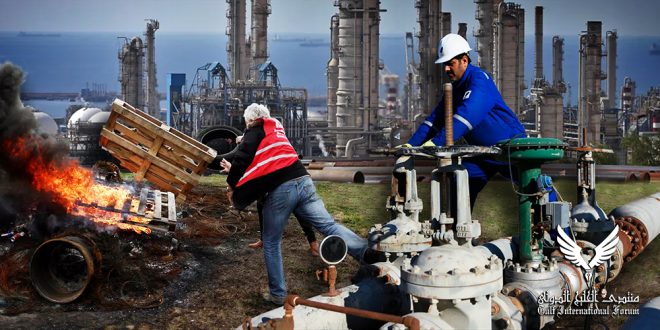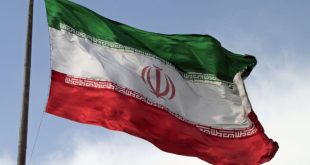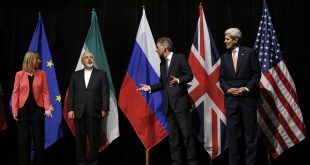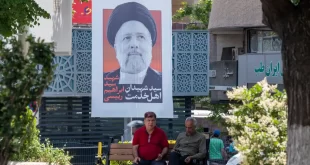In 1979, oil workers in Iran dealt a blow to the Pahlavi dynasty; now, instability in Iran’s energy sector could once again put tremendous pressure on the regime or lead to the fall of the Islamic Republic itself.
Considering the central role of energy exports to Iran’s economy, the security of the nation’s energy supply and infrastructure directly correlates with its national security. Over the past four decades, the Islamic Republic has made many investments in the physical protection and security of its key infrastructure. Due to an unending raft of international sanctions, it has always prioritized the security of its energy infrastructure. In 1979, during the Iranian Revolution, the workers of the oil industry played an important role in the fall of the Shah, shutting down oil production and depriving the Shah’s government of a key source of revenue. The economic importance of oil to the survival of the Pahlavi dynasty highlighted its strategic status in the public consciousness; in the contemporary history of Iran, the workers of the oil industry were perceived as one of the pillars of the revolution, and the role played by the brave struggles of workers and employees of Iran’s oil and gas industry during the revolution was so decisive and inspiring for other classes and people of Iran that in the final months leading up to the revolution, the saying (کارگرنفت ما رهبر سرسخت ما) “our oil worker, our tenacious leader” became one of the most important revolutionary slogans.
Forty years later, the growing participation of oil and petrochemical workers in today’s protest movements has led the media in the United States, Europe and other parts of the world to show wider attention and coverage to the Iranian crisis. On Wednesday, October 12, the New York Times published a report on a strike by oil industry workers in the south of Iran, framing it as a sign of the expansion of the scope of the recent protests. The Kangan and Bushehr Petrochemical Project in Asaluyeh has been severely impacted, with the continuation of strikes despite the arrest of 11 oil workers for striking on October 11. The newspaper underlined the importance of “strikes that can cause […] damage to the economy, especially the strikes by the market unions and the oil and energy sector” throughout the history of Iran, referring to how collective action accelerated the collapse of the Pahlavi dynasty.
Striking Oil
Last week, several contract workers within Iran’s oil industry went on strike. The organizing council of contract workers’ protests announced on Wednesday, October 12, that at least 18 workers had been arrested by security forces. Concerns about the expansion of the contract workers’ strike have caused the closure of several large companies’ projects in Asaluyeh. Last week, the Council of the Union of Free Workers of Iran issued two statements that warned against the “repression of the protesters against the death of Mahsa Amini.” The Council announced that if the security forces do not lay down their weapons, the workers will strike. Local sources have noted that strikes in Asaluyeh were conducted by short-term contract workers rather than full-time staff under the tight-control of the National Iranian Oil Refining and Distribution Company—the state-owned oil company. Contract employees also appear to be leading the strikes in Abadan. Abadan and Asaluyeh are both significant refineries; Abadan is one of Iran’s oldest oil refineries and Asaluyeh handles gas from South Pars. Although both refineries are far from the capital, Tehran will surely be aware of the spreading discontent at the plants, and of the impact of similar events during the 1979 revolution. The protests in the refineries, though relatively contained thus far, represent the first impact of Mahsa Amini’s death on the oil and gas industries in Iran.
Iran’s hydrocarbon exports remain key to Iran’s economic wellbeing, regardless of U.S.-imposed sanctions against the country. In the third quarter of FY 2022, Iran exported close to 750,000 barrels per day of crude oil. While this figure remains lower than the pre-sanction rate of two million barrels per day, it is nonetheless an improvement on 2019-2021 export rates. To date, these protests have not had a significant impact on production, but as they grow, Iran’s key oil-producing region of Khuzestan could be affected.
Oil Exports
Kpler economist Reid L’Anson has noted that global energy markets will not, in all likelihood, be significantly impacted by collective action in Iran’s oil sector. As Iran’s export capacity already suffers from the international sanctions regime, there are not many available buyers of Iranian oil to begin with. However, some impact may be seen in Iranian oil trade with China. L’Anson remarked that the average U.S. customer is primarily interested in domestic fuel prices, which have risen since a mid-September low. Tehran hopes that Western sanctions against Russia will create a higher demand for Iranian oil exports, but this would require European leaders to convince Washington to lift sanctions against Iran, though this appears unlikely amid the protest movement and subsequent crackdown. Even if the West were to reverse course on sanctions, strikes within Iran could complicate efforts to increase production. Meanwhile, repressive actions by the regime would prevent human rights-conscious nations in Europe from wanting to deal with Iran.
Before the strike of the oil industry workers, Iranian Oil Minister Javad Owji claimed that the export of Iranian crude oil was “being carried out without any problems to the target markets.” He also pushed the idea of making Iran’s crude oil, gas condensate, petroleum products and petrochemical products more attractive to international buyers. Owji emphasized that the issue of energy security was one of the most salient issues in the global economy, and that its importance would only increase as winter arrives in the northern hemisphere. While the JCPOA nuclear talks have ground to a halt and midterm elections will be held in America next month, the American government has announced that it is carefully monitoring the developments in Iran and has voiced its opposition to the Iranian government’s ongoing crackdown against the protesters.
U.S. State Department spokesman Ned Price stated last week that a nuclear deal with Iran is not Washington’s priority at the moment. Instead, Price said, the United States has offered its support to Iranian protest movements. “The Iranians have made very clear that this is not a deal that they have been prepared to make,” said Price, claiming that a revival of the nuclear deal with Iran was unlikely under current conditions. He further stated that Tehran’s list of demands to return to the JCPOA were unacceptable for Washington.
If the scope of Iranian protests expands to oil and gas fields across the country and a larger portion of the National Iranian Oil Refining and Distribution Company workers join the protests, Iran will face an immense energy and economic crisis. The Minister of Oil has warned many times that Iran already faces a shortage of natural gas and electricity in winter—a situation that may be partially ameliorated with gas imports from Russia, but is nonetheless indicative of systemic problems in the country’s hydrocarbon industry. Mounting social unrest in the hydrocarbon sector could lead to a gradual decrease in oil and gas production and a decrease in Iran’s crude oil exports. In turn, instability would eventually lead to more economic hardship and even the fall of the Islamic Republic itself. Of course, leaders in Tehran understand this, and will use any means necessary—including extreme violence—to prevent the spread of protests among oil industry workers.
www.gulfif.org





